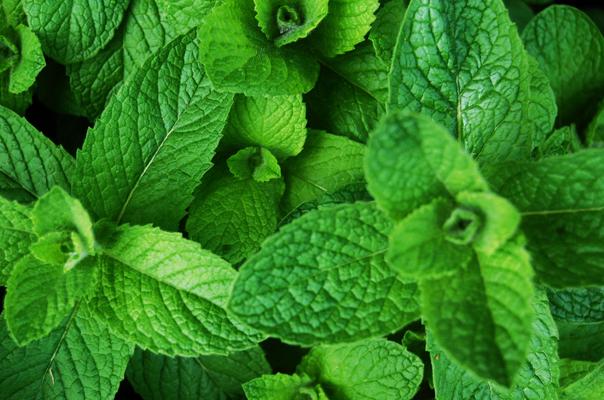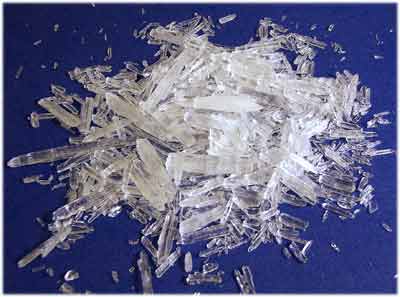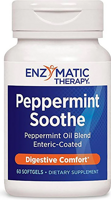Peppermint (Mentha piperita) is a plant that yields a volatile oil -- known as menthol -- used for medicinal purposes as well as flavoring and aromatherapy. The aromatic, dark green plant has small purple flowers. It hails from Asia and Europe, but is also found in North America, South Africa, South America, and Australia. Peppermint can grow up to about three feet tall.
Uses
Above all, peppermint is a popular flavoring. It's also used as a digestive aid, and for its calming and numbing properties. Peppermint has been used to kill types of bacteria, viruses, and fungus in test tubes. Several studies support its use for these purposes and more.
Medicinal puroses
Upset stomach, indigestion: peppermint capsules has been known to treat symptoms of irritable bowel syndrome, including bloating, gas, diarrhea, and stomach pain.
Headache: applying peppermint tincture to the temples and forehead may reduce head pain.
Anxiety
Liver and gallbladder problems
Nausea
Menstrual cramps
Cold, cough: the main ingredient in peppermint, menthol, can thin mucus and is an effective decongestant
Infection
Topical
Peppermint essential oils improves blood pressure, respiratory rate, and exercise performance in young male students.
Skin problems: the menthol plant has a cooling and soothing effect on skin irritations
Inflammation
Mosquito repellent
Ingredient
Flavoring: peppermint is commonly used as a favoring in gum, toothpaste, and tea.
Fragrance: aromatic peppermint oil is used in soap and cosmetics.
Recommended dose
Dose is dependent on the reason you're taking peppermint. Tea is used for treating indigestion or fatigue. Capsules are used for the treatment of IBS. Peppermint tincture can help ease headache pain. A topical ointment can be used for skin problems and bug bites.Tea: 1 tsp. dried peppermint leaves steeped in 1 cup boiling water for 10 minutes. Drink four to five times daily, between meals.
Capsules: 1 to 2 capsules (0.2ml peppermint oil), two to three times per day.
Tincture: 10% pepperint oil to 90% ethanol. Apply light coating to your forehead and allow solution to evaporate.
Ointment: Menthol ointment with peppermint as the active ingredient. Apply to skin up to four time per day.
Children
Do not give peppermint to children. When applied to the face, peppermint oil can cause breathing problems. Peppermint tea can cause a burning sensation in a child's mouth.
When directed by your pediatrician, older children can take 1mL to 2mL peppermint glycerite per day for digestion and upset stomach.
Medication and food interactions
| Medication | Side effect |
|---|---|
| Cyclosporine | Used by patients with organ transplants, peppermint may intensify medication side effects. |
| Medications changed by the liver | Taking the two together may intensify the medication's effects and side effects |
| Antacids | Take coated peppermint oil products at least two hours before antacids. |
| Diabetes medications | Peppermint may reduce blood sugar, potentially causing hypoglycemia. |
| Blood pressure medications | Peppermint may reduce blood pressure as well, possibly causing dangerously low BP. |
| Medications that reduce stomach acids | Take coated peppermint oil products at least two hours before these medications. |
Available forms
Peppermint can be prepared as a tea, tincture, capsule, cream, and ointment.Does peppermint work
Peppermint may work for:
Heartburn
Pain relief
Flatulence
Relaxing the colon during exams, such as a barium enema.
Tension headaches
Hives and skin irritations
Cold and flu
There isn't enough evidence to recommend peppermint for:
Itchy skin
Infections
Morning sickness
Toothache
Cough and cold
Inflammation
Post-operative nausea
Side effects
Peppermint consumed from food is generally safe.
Peppermint oil for medicinal purposes and applied to the skin is generally safe if used in recommended amounts.
Peppermint leaf should only be used for up to eight weeks.
Peppermint may aggravate gallstones.
Peppermint side effects include heartburn, headache, flushing, and mouth sores.
Menthol or peppermint oil may cause skin rash.
Peppermint found in food is generally considered safe for women who are pregnant or breastfeeding. Do not take large medicinal doses, though.
Taking large amounts of peppermint could be toxic. Never ingest menthol -- it is poisonous.
Do not take enteric-coated peppermint oil if you have stomach problems (particularly if your stomach is not producing hydrochloric acid) without first consulting your doctor.
Do not take enteric-coated peppermint oil if you have diarrhea.
Do not take peppermint if you have gastroesophageal reflux disease (GERD). This includes peppermint tea.
Considerations
Supplements are not strictly regulated by the government. There is no guarantee that they are safe or will do what they are supposed to do.
Tell your healthcare team about all the medications, supplements, and herbs you are taking.
Supplements can act like drugs when taken in high doses. Read all directions and use with care.
References
- MedlinePlus; "Peppermint;" Updated 2013
- University of Maryland Medical Center; "Peppermint;" 2011
- Abbas Meamarbashi, Ali Rajabi; Journal of the International Society of Sports Nutrition; "The effects of peppermint on exercise performance;" 2013
Peppermint News on PricePlow
-
Apr 23, 2023 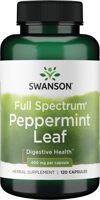
Product News
Swanson Peppermint Leaf, Full Spectrum was created.
Categories: Gut Health Supplements, Peppermint -
Apr 19, 2023 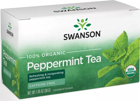
Product News
Swanson 100% Organic Peppermint Tea was created.
Category: Peppermint -
Jan 05, 2019 
YouTube Video
PEScience Select Protein White Chocolate Mint Review
Sign up for future Peppermint news!
Click the button below to sign up for future Peppermint news, deals, coupons, and reviews!
Peppermint Reviews & Videos
Subscribe for more Peppermint news and alerts!
Subscribe to PricePlow on YouTube, follow PricePlow on Instagram or click the button below to sign up for our latest Peppermint news and reviews!
